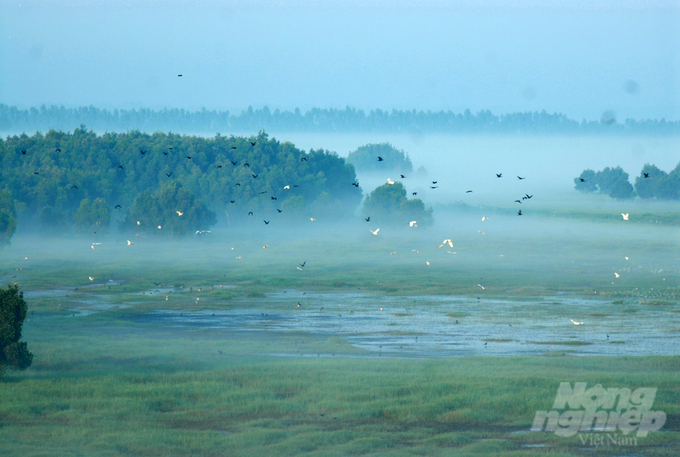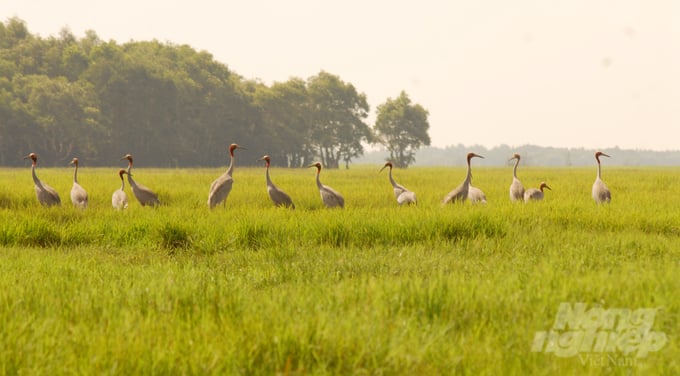May 16, 2025 | 10:36 GMT +7
May 16, 2025 | 10:36 GMT +7
Hotline: 0913.378.918
May 16, 2025 | 10:36 GMT +7
Hotline: 0913.378.918
Referring to Dong Thap is the mention of fragrant lotus ponds, the poetic beauty of Sa Dec flower gardens, or the vast rice fields with stork wings flying. Dong Thap also appears with an extremely pristine image, somewhat more lively when coming to Tram Chim National Park and listening to the sounds of wild nature.

Tram Chim National Park is located in the core area of Dong Thap Muoi, Tam Nong district, Dong Thap province. Photo: Le Hoang Vu.
Tram Chim National Park is located in the core area of Dong Thap Muoi, Tam Nong district, Dong Thap province, with a total area of 7,500 hectares within the boundaries of five communes of Tan Cong Sinh, Phu Duc, Phu Hiep, Phu Thanh B, and Phu Tho, and Tram Chim town. Particularly, the National Park gathers all kinds of models of the Dong Thap Muoi region, from the low-lying area with year-round flooding water to the dry area flooded seasonally.
With an extremely diverse and rich ecosystem, in 1994, Tram Chim National Park was recognized as a National Nature Reserve. In 2012, it was recognized by the Ramsar Convention Secretariat as a Ramsar site in the world. This is Vietnam's 4th Ramsar site and the world's 2,000th Ramsar site.
Tram Chim National Park is a wetland and is also considered a "green lung" and a "freshwater storage bag," effectively serving the Mekong Delta people in agricultural production. Additionally, Tram Chim National Park is ranked in Vietnam's important special-use forest system.
This place stands out with its rich ecosystem and unique natural landscape and possesses many rare bird species, such as Sarus cranes. It is the abundance of flora and fauna that has created a rich and unique natural landscape for Tram Chim National Park.
Specifically, this land of "six months the fields are dry with burning grass, six months the fields are flooded with white water" is a place for the development of rich vegetation with more than 130 different species.
The fauna here stands out with an abundant waterbird system, including 233 species belonging to 25 genera and 49 families, accounting for one quarter of the total number of bird species discovered in Vietnam. And especially, the Sarus crane species, the largest in the Crane family, is an invaluable natural asset of Tram Chim National Park in the Land of Pink Lotus.
Thus, it can be said that Tram Chim National Park is the area of the richest biodiversity in the entire Dong Thap Muoi region. With the role and biodiversity value of Tram Chim National Park, in recent times, the government of Dong Thap province as well as international organizations and experts have paid special attention to managing and preserving the Park's ecosystem.

The Sarus crane species, the largest in the Crane family, is an invaluable natural asset of Tram Chim National Park. Photo: Hoang Vu.
According to Mr. Doan Van Nhanh, Deputy Director of Tram Chim National Park Conservation Center, in recent years, Dong Thap provincial leaders have invested a lot in managing and preserving the ecosystem of the National Park.
First, Dong Thap province has invested in biodiversity conservation and monitoring. This is one of the extremely important activities in the annual inspection and evaluation at the Park. Second, invest in plans to control exotic species because, in current conditions with external impacts, there are many types of exotic species that will invade.
Besides, the province has also invested a lot in infrastructure to serve the management of the National Park, such as some water regulation works and annual forest fire prevention and fighting programs. At the same time, invest in training human resources to operate, manage, and preserve the Park. In addition, programs, domestic and foreign organizations, as well as experts, have greatly supported the Tram Chim National Park over the years.
Despite great investments and attention from all relevant parties, those investments have still not met expectations. Sharing about this issue with Vietnam Agriculture Newspaper, Dr. Duong Van Ni, Chairman of the Mekong Conservancy Foundation, said: "It is clearly seen that we invested but lacked key points and important periods and stages. Obviously, when we invest in a project without careful calculation, it will not meet the expectations of our conservation goals."
According to Dr. Duong Van Ni, in the subsequent years, these shortcomings have been tried to overcome. For example, with the funding from some organizations, such as IUCN and WWF, the height of some canal and dyke sections that are not suitable or block the flow has been lowered. As a result, the water could overflow, and from the grassland to fish, shrimp, birds, and storks all recovered very quickly.
"This shows that in the work of managing and preserving the ecosystem of Tram Chim National Park, it is necessary to calculate exactly what key points we need to invest money in so that we can maintain the functions and diversity of the National Park. Otherwise, despite much money, we still do not implement our conservation goals well," shared Chairman of the Mekong Conservancy Foundation Duong Van Ni.
Translated by Thu Huyen

(VAN) Cold-barn systems efficiently manage environmental and temperature conditions, which aids in the prevention of respiratory diseases in pigs and protects them from the vectors that transmit African swine fevers.

(VAN) To tackle challenges, the project 'Addressing key technical bottlenecks in the grouper supply chain in Vietnam' has been underway since 2024.

(VAN) The project 'Disease-Resilient and Sustainable Cassava Production Systems in the Mekong Region', funded by the Australian Center for International Agricultural Research (ACIAR), is being implemented from 2024 to 2028.

(VAN) Data from 10,000 farming households will help professionalize production organization and support the implementation of the One Million Hectares Program for High-Quality, Low-Emission Rice Cultivation.

(VAN) FAO Director-General QU Dongyu marks International Day of Plant Health at NENA conference.

(VAN) Deputy Minister of Agriculture and Environment Hoang Trung affirmed that floriculture and ornamental plants are a growing industry that receives significant global attention.

(VAN) The three staple crops dominating modern diets – corn, rice and wheat – are familiar to Americans. However, fourth place is held by a dark horse: cassava.